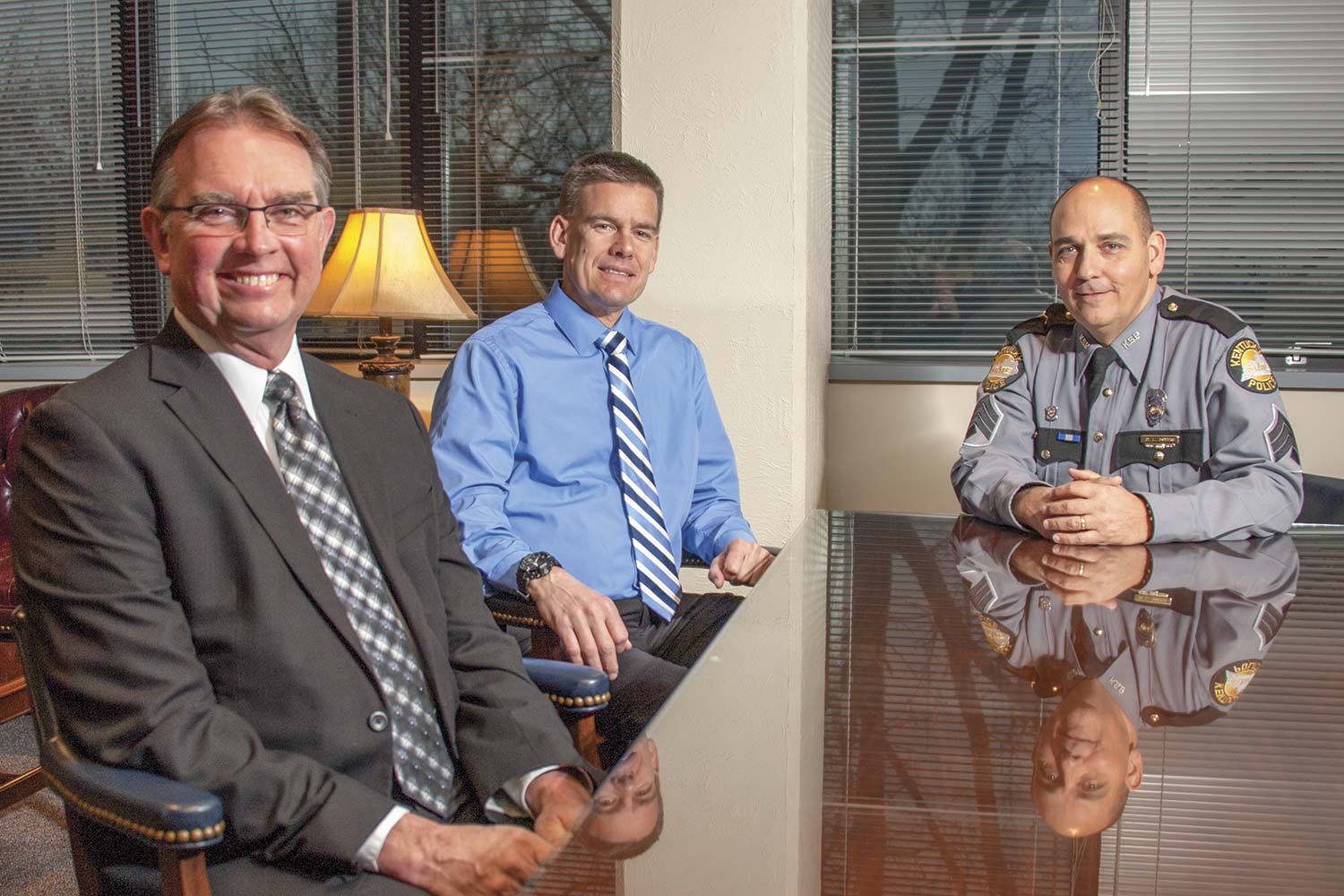Internal Support
Standing as strong sentinels for the safety of others, law enforcement officers are often noted and revered for their ability to run toward danger when others are running away. By the nature of the job, those who choose the thin blue line experience violence and tragedy. Yet, they carry on living as spouses, parents, children and community members.
Few mention the toll that the sights and circumstances of keeping the peace can have on an officer’s mental health and relationships. Still, fewer resources are available for officers seeking assistance with post-traumatic stress (PTS) or other mental health issues.
However, the key word is few.
Some agencies have sought to make mental health a priority, succeeding in chipping away at the stigma and providing hope to those who serve others.
Kentucky State Police
Providing support for Kentucky State Police cadets begins on day one, according to KSP Employee Assistance Branch Psychologist Chuck Biebel.
During pre-employment psychological assessments, recruits meet members of the agency’s Employee Assistance Branch (EAB), who offer services not only to sworn officers but also to dispatchers, civilian employees and family members. All discussions are confidential.
“We try to help people if they begin to go off track, regardless if that is a stressful home life, development of an addiction or a critical incident,” explained KSP EAB Chaplain and Commander Sgt. David Norris.
The commander said his team gives troopers a “bigger toolbox” by connecting them with local treatment and suitable programs, such as Alcoholics Anonymous or marriage counseling, and periodically “checking in” to make sure they are utilizing these tools. As an added resource, Biebel noted the EAB keeps track of services throughout the state that work with law enforcement.
From left: Program coordinator, chaplain and retired trooper James Hodge, psychologist Chuck Biebel and program commander and chaplain Sgt. David Norris comprise the Kentucky State Police Employee Assistance Branch that strives to provide mental health support to the agency’s troopers and dispatchers. (Photo by Jim Robertson)
During critical incidents, such as officer-involved shootings, Biebel said team members, typically, talk to the involved trooper immediately by phone and then schedule a meeting face-to-face for a critical-incident debriefing.
“Initially, our biggest goal is to give them information, so they know what signs and symptoms to look for in hopes that we can prevent PTS,” said Biebel.
Individuals who have undergone a critical incident may experience reoccurring images or nightmares, doubting if they took the right action or feeling measures of guilt, Norris detailed.
Throughout, KSP EAB stays in contact, specifically communicating with officers returning to work after an event to make sure they feel ready to hit the streets once more.
In 2016, KSP established a peer support team. The team is comprised of about 15 members across the state who have been trained by the Kentucky Community Crisis Response Board (KCCRB). These critical-incident stress management-trained troopers can offer services during critical incidents. By utilizing peers, officers can receive help from someone with whom they might be more comfortable.
“Peers sometimes have more credibility (with the officers) than a psychologist or chaplain who might be seen as coming in from headquarters,” Norris said. “Everyone thinks about shootings, but peers are driven to help one another through all hardships faced in this line of work, including family worries, stress or even social media chatter…not everyone is stressed about the same things.”
Peers have the added benefit of being able to keep a finger to the pulse of their comrade’s healing progress.
Louisville Metro Police Department
Louisville Metro Police Department also utilizes a peer-support model. The peer support team responds to critical incidents such as shootings or on-the-job deaths, as well as other subtler stressors. Support is given throughout any required investigation and in the days, weeks, months and even years that follow an incident, according to the program’s commander Lt. Michael O’Neil.
Support for the team among officers has grown, and trust has been built. O’Neil said LMPD officers have come to expect his team’s response to critical incidents and their high quality of service. No matter the time, day or night, they are there.
“We want to prevent this job from taking people down a road they don’t want to go on,” said O’Neil. “We want them to have a healthy career and healthy life. Peer support is a great way to do that.”
Lt. Michael O’Neil serves as commander of the Louisville Metro Police Department’s Peer Support Team which responds to critical incidents such as shootings or on-the-job- deaths, as well as other subtler stressors. Day or night, they are there. (Photo by Jim Robertson)
Another beneficial way LMPD supports their officers is with the addition of Dr. Michael Freville, a licensed clinical counselor.
As the department’s psychologist, Freville’s services are offered free of charge, with no referrals needed, to officers and their families to help cope with critical incidents, stress, personal problems and work life.
“Doc being a constant face of assistance for our officers has been a huge step forward,” O’Neil noted.
Each session is confidential, no notes are ever taken, and reports are never made to higher-ups, Freville explained.
Louisville Metro Police Department Psychologist Dr. Michael Freville is a constant face of assistance for officers and their families. All services are provided free of charge, no referrals required. Each session is confidential; no notes are ever taken. (Photo by Jim Robertson)
In addition to providing his services at department debriefings, Freville sees officers in his office within 48 hours of a critical incident. Afterward, Freville remains available when they need to talk through triggered emotions, concerns or tough incident anniversary dates.
“In my office, we help to normalize (officers’) reactions to abnormal and unusual events,” said Freville. “We don’t want anyone to think their reaction is bad or wrong. They are human…I’m focused on that and the effect whatever they went through has on them and their family members.”
Additionally, the topic of handling stress and family is brought up at periodic in-service training, appealing to the officers’ maternal and paternal instincts as an incentive for seeking stress management not only for themselves, but also for their spouses and children.
Georgetown Police Department
Making the mind and body connection is the Georgetown Police Department who, when its new facility was constructed in 2015, installed a fitness center. According to Chief Michael Bosse, when staffing and time allow and with supervisory permission, officers may work out for an hour during their shift.
“There’s a strong connection between physical fitness and the ability to relieve stress and mental health,” Bosse said. “Problems begin to compound when one doesn’t feel good physically. That tends to affect their outlook.”
Officers cope with stressors daily. However, Georgetown Police Chief Michael Bosse said, in perfect leadership, officers should feel they can approach leaders and say they need to talk about things that are bothering them. (Photo by Jim Robertson)
A balanced mind and body can also help officers provide a higher level of service to their community, Bosse added.
For additional support, officers have the option of speaking with the department chaplain, as well as two victims’ advocates when they need a listening ear. Sergeants, first-line supervisors and other leaders are also instructed to watch for stressors among their shifts.
“In perfect leadership, officers should feel comfortable approaching leaders and saying ‘Hey, can I talk about something?’” said Bosse. “That is the environment we try to create.”
Officers cope with stressors daily, just by the nature of the job, and then a critical incident can happen. Bosse said that is why he asks officers to support each other. Following through, some GPD officers have attended Crisis Intervention Team (CIT) training to be prepared in case of a critical incident.
Resources
Utilizing outside training through CIT, KCCRB and the Department of Criminal Justice Training’s Kentucky Post Critical Incident Seminar (KYPCIS) was recommended by all three interviewed agencies.
For departments, even smaller ones looking to provide their own internal mental health resources, training can be a way to have individuals present who can recognize symptoms of stress and conduct basic debriefings, KSP’s Biebel explained.
“KYPCIS is an outstanding program,” he continued. “A lot of our troopers have been through the program and have followed through and become KYPCIS peers.”
Additionally, KSP and LMPD assist smaller agencies, during critical incidents, that might not have the same level of resources, based on their availability and the nature of the event. Help has come in the form of debriefings, peer support and referrals to outside agencies such as the KCCRB.
“While our services are geared internally (toward our agency) we will help anybody that needs assistance. That’s the name of the game,” Biebel said.
Trained or not, one of the largest resources for departments is law enforcement comradery. Often those closest to an individual are the ones to notice abnormal behavior, such as extreme risk-taking, increased depression or verbalizing self-harm in jests, Norris said.
“That old saying goes, ‘See something, say something,’” he added. “Just let (your fellow officers) know they aren’t alone. You might not know what to do, but you can point them in the right direction.”
Solutions are also more achievable if people are willing to talk. Bosse said he wishes chiefs and sheriffs were more willing to connect and discuss mental health challenges so they could tackle the issue together.
Bridging the gap between the body and the mind, Georgetown Police Department officers are encouraged to take advantage of their in-house fitness center to relieve stress. (Photo by Jim Robertson)
Overcoming Stigma from Within
No matter how many tools are given, one of the largest barriers between an officer seeking assistance and the resource they need is the stigma built up surrounding mental health.
Once the mention of mental health and suicide risk was taboo. Biebel said he doesn’t remember PTS ever being mentioned when he was in the academy.
To make officers more willing to seek assistance instead of succumbing to the stigma that needing help equals weakness, KSP cadets attend an introduction to employee assistance that covers basic stress management principles and also addresses suicide prevention.
“(PTS) doesn’t mean you are weak,” Biebel said. “It’s a normal reaction to a very abnormal event.”
And while officers tend to hold things in, be macho and carry things on their own, Norris said that studies involving military and law enforcement show that not dealing with issues immediately can lead to more problems down the road.
“We have to understand that law enforcement are humans too. We have to understand that they are humans when they put on their uniform and they are humans when they take them off. And with that, there are a lot of emotions that come from responding to horrific scenes and circumstances,” said LMPD’s O’Neil, adding that the old mentality of “sucking it up and driving on” has injured officers in the past.
“You can’t believe everything you think in your mind,” said Norris to officers who might be needing assistance, noting that individuals are often driven to suicide by hopelessness. “You may think you are the only person who has experienced this, or that this issue is affecting, but there are people who want to help you who have likely experienced a similar situation. You don’t have to go through this alone, regardless of what the situation is.”










